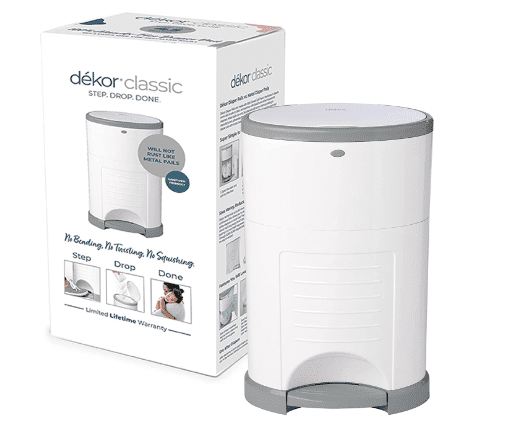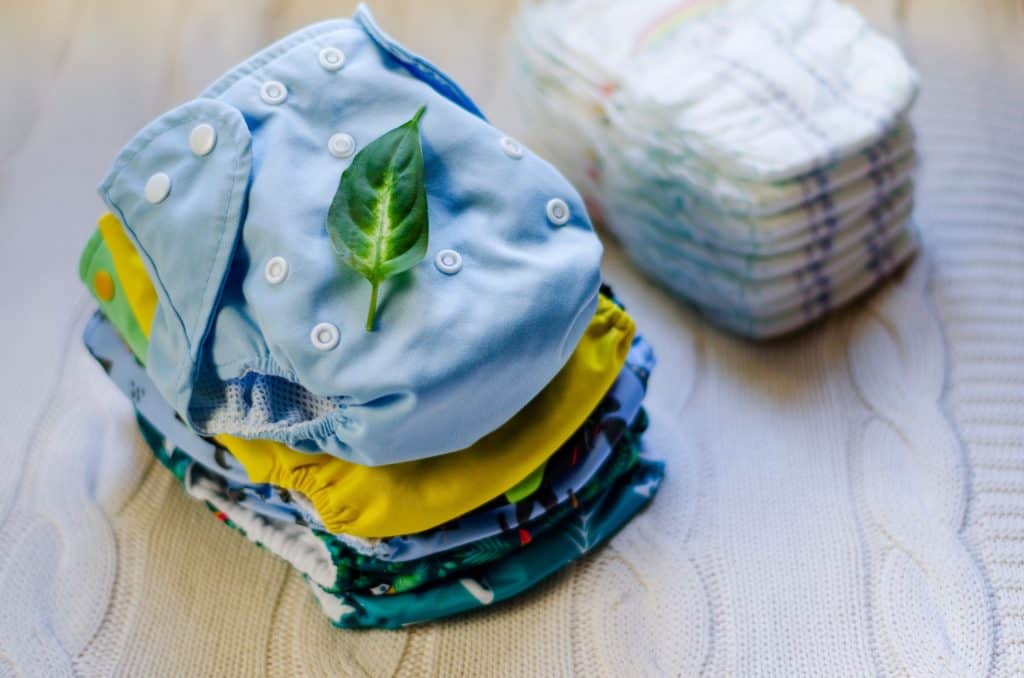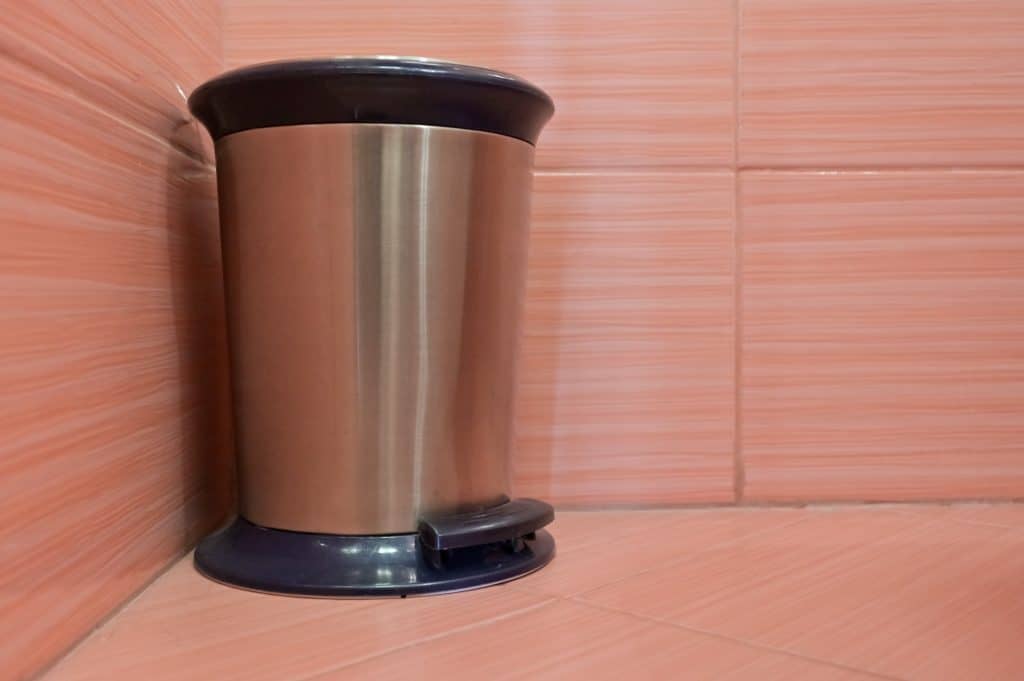Dealing with soiled diapers is a pain. The smell is awful, clinging to the room and wafting through most trash bins no matter how tightly you try to seal them. A diaper pail may not seem necessary, but you might find yourself changing your tune once you’re going through a dozen or so soiled nappies a day!
Is a diaper pail necessary? Diaper pails are essentially fancy trash bins, but they’re made to address common inconveniences parents often experience while changing diapers.
They’re easy to clean, tamper-proof, and still have plenty of use even after your baby stops needing diapers. Diaper pails do have some limitations, but little in terms of drawbacks – other than the price!
Diaper pails offer a ton of convenience, but they aren’t a strict household necessity. Quality ones also don’t come cheaply, so be sure to weigh the pros and cons of the purchase to best make an informed decision.
Do You Really Need a Diaper Pail?

Diaper pails provide you with a dedicated receptacle to handle your baby’s little messes. Not only do they do an amazing job at keeping unwanted smells contained, but they also happen to be (mostly) tamper-proof thanks to that design goal!
While any trash container “could” be used, diaper pails do it best for a number of reasons:
- They tend to be made of less porous material like metal (keeping bad smells in)
- They have unique seal mechanisms that protect them from tampering (children or pets)
- They may also provide more convenient functionalities for your needs (one-handed use)
- They make use of special bags properly tailored to handle the odor of used diapers
Without a diaper pail, parents might have to settle for sub-par, not-quite-airtight receptacles, which can lead to bad odors permeating the household.
Alternatively, they might opt to individually wrap and dispose of each nappy after use. It’s a great approach for confining the smell, but this involves a lot of effort and isn’t an environment-friendly option.
Some parents might also be able to set up a dedicated nappy change room, but if you can afford to set aside that much space just for that purpose, budget probably wasn’t your family’s most pressing issue.
Diaper pails offer convenience. It’s up to you to decide whether the perks are worth the price.
1. They Synergize Well with Reusable Diapers

Cloth diapers are reusable, eco-friendly alternatives to normal diapers. They can be reused for months, and can even be passed down to younger siblings (after a thorough cleaning, of course!).
As you can guess, you can’t just toss a cloth diaper in with the normal garbage. Sorting them out for individual cleaning might be an option, but the tedium won’t be needed if you get yourself a diaper pail.
A diaper pail provides dedicated, sanitary bulk storage for reusable diapers. It’ll also do a great job preventing foul odors from defusing into the open air.
More modern cloth diapers work better with dry storage, so be sure to line your diaper pail with waterproof plastic first. Don’t use cloth linings, as the odors will end up lingering in the fabric.
If your baby is still on breastmilk, you don’t even have to scrape their mess off the diaper – those stains should easily come out after a wash or two! The same doesn’t extend to formula, as it’s tougher for infants to digest. Do keep that in mind, or you might have a mess on your hands!
2. They’re Easy to Disinfect and Dry
Provided you put in the effort to seal each diaper properly, cleaning the diaper pail should be a simple and routine task. Any bacteria inside wouldn’t have the opportunity to spread in such a closed-off environment, and the odors should pass quickly enough after a thorough cleaning.
Simply clear your diaper pail out at the end of the day, then spray the container down with a generous helping of rubbing alcohol. Wipe it dry with a clean cloth after a few minutes.
For deeper cleaning, make use of hot, soapy water once a week. Pour your mix (1 cup water: 2-3 tbsp soap) into the diaper pail, let sit for half an hour, then rinse thoroughly. Afterward, repeat the procedure with just the hot water to get rid of any leftover soap suds.
Other trash bins are only expected to hold solid garbage. Disinfecting with these methods – most especially soapy water – risks causing leaks, which would demand even more of your time cleaning up.
Trash bins might also be made of cheaper materials like plastic, which cannot safely handle the heat. The warm water could cause the plastic to break down, releasing BPA, a hazardous chemical. Even if that weren’t an issue, the smell of dirty diapers lingers for a lot longer in plastic storage receptacles.
In summary, a sturdy diaper pail is simple to disinfect when compared to less purpose-made contemporary options. There’s also little risk of water or odor leaks due to their airtight designs.
3. They’re (Mostly) Tamper-Proof

Few things are worse for parents to hear than the unmistakable sound of a trash can tipping over, knowing that every idle second would equate to a bigger mess they’d soon stumble onto! Apart from the occasional curious pet, children are the usual culprit behind these incidents.
Diaper pails make use of different sealing mechanisms – some might require you to turn the top, others could need a bit unlatched, and others need you to step on a foot pedal to operate.
They aren’t foolproof measures, but should be more than enough to mitigate the majority of trash spills in your home. Even if they do end up spilling regardless, cleanup should be much simpler.
In general, diaper pails are safe enough to keep around children, pets, and clumsy people alike!
4. You’ll still Have to Open It at some Point

This isn’t a drawback per se – more so a limitation most advertisers gloss over. Diaper pails keep unwanted odors in due to their airtight designs, but that only applies when the lid stays shut.
The diaper pile will start building up over time and the seal in place means that the cumulative stink is stuck inside with no other place to go. It’ll smell horrible and possibly overwhelming, but dealing with the stink of soiled diapers is just a part of parenthood.
Most parents get used to it. We hope that adjustment comes quickly in your family.
The point here is that while having a diaper pail on hand is a huge advantage, it’s not nearly as impressive or life-changing as advertisers want you to believe it is.
You’ll still be dealing with the smell no matter what – a diaper basket ensures that you at least get some reprieve from the odor. Is it worth the premium overhead cost?
That’s for you to decide.
5. It can always be Repurposed once Their Diaper Phase passes
Diaper pails may seem like a huge, unnecessary financial commitment. You might even be worried that your purchase will go to waste once your baby outgrows their diapers, but that’s not the case.
Remember that you’re basically buying an airtight, (mostly) tamper-proof waste bin here – it’s not something that’ll lose much utility after its original use, especially in a busy household!
Diaper pails are used to handle diapers, which are chock full of unhygienic waste. You could easily reuse the bin to handle less sanitary garbage in your home – things like old bandages, used toilet paper or spent hygiene products can be safely stored in an old diaper pail.
They also excel at handling food waste for similar reasons. A quality diaper pail is an investment, and it’ll still be paying dividends in your life even long after your little one is out of their diapers.
Alternatively, you could also sell off your old diaper pail to others in need. This way lets you recoup some of your original investment, and you’ll be helping out another family to boot!
Final Thoughts
Diaper pails are a very useful tool for parents, but they are far from a necessity. They’re low-maintenance, air-tight, tamper-proof (mostly), and do a great job containing unpleasant odors. Not every household needs one, but it’s definitely worth the convenience – if your family can set aside a budget for it!